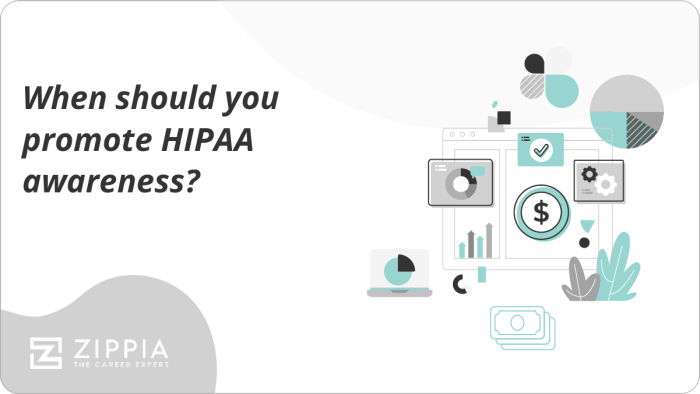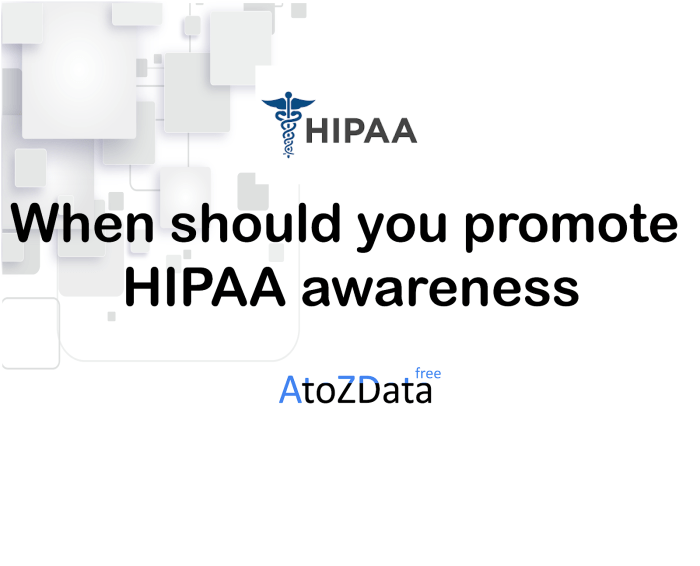When should you promote hipaa awareness – Exploring the opportune moments to promote HIPAA awareness is crucial for healthcare organizations. By understanding the significance of HIPAA compliance and its implications, healthcare providers can effectively safeguard patient data and mitigate potential risks. This article delves into the various scenarios when promoting HIPAA awareness becomes imperative, providing valuable insights and best practices for successful implementation.
Throughout this discussion, we will emphasize the importance of regular employee education, patient engagement, vendor management, risk assessment and mitigation, and staying abreast of enforcement and penalties to ensure comprehensive HIPAA compliance.
Employee Education

Employee negligence is a major contributor to HIPAA violations. According to a study by the Ponemon Institute, 62% of HIPAA breaches in 2021 were caused by employee error.
Regular HIPAA training is essential for employees to understand their roles and responsibilities in protecting patient information. Training should cover topics such as:
- The HIPAA Privacy Rule and Security Rule
- Patient rights
- How to handle and protect patient information
- How to report HIPAA breaches
Management plays a critical role in promoting HIPAA awareness among staff. Managers should:
- Set clear expectations for HIPAA compliance
- Provide regular HIPAA training
- Monitor employee compliance with HIPAA regulations
- Discipline employees who violate HIPAA regulations
Patient Engagement: When Should You Promote Hipaa Awareness
Patients have a right to understand how their health information is being used and protected. Healthcare providers can engage patients in HIPAA awareness by:
- Providing patient education materials about HIPAA
- Encouraging patients to ask questions about their health information
- Creating patient-friendly materials on HIPAA compliance
Patients can also play a role in protecting their own health information by:
- Understanding their rights under HIPAA
- Reporting potential HIPAA breaches to their healthcare provider
- Taking steps to protect their health information, such as using strong passwords and being careful about what they share online
Vendor Management
Healthcare providers must carefully select HIPAA-compliant vendors. When selecting a vendor, healthcare providers should:
- Conduct due diligence to ensure that the vendor is HIPAA-compliant
- Review the vendor’s HIPAA compliance policies and procedures
- Obtain a signed business associate agreement (BAA) from the vendor
Healthcare providers should also monitor their vendors’ HIPAA compliance on an ongoing basis. If a vendor is found to be non-compliant, the healthcare provider should take steps to terminate the relationship.
Risk Assessment and Mitigation

Healthcare providers must conduct a HIPAA risk assessment to identify and mitigate potential risks to patient health information. The risk assessment should include:
- A review of the healthcare provider’s HIPAA compliance policies and procedures
- An assessment of the healthcare provider’s IT systems and infrastructure
- An assessment of the healthcare provider’s workforce
Once the risk assessment is complete, the healthcare provider should develop and implement a HIPAA security plan to mitigate the identified risks. The security plan should include:
- Technical safeguards, such as firewalls and intrusion detection systems
- Physical safeguards, such as access control and security cameras
- Administrative safeguards, such as HIPAA training and privacy policies
Enforcement and Penalties

The Office for Civil Rights (OCR) is responsible for enforcing HIPAA. OCR can investigate HIPAA violations and impose penalties on healthcare providers that are found to be non-compliant. The penalties for HIPAA violations can be significant, including:
- Fines of up to $1.5 million per violation
- Corrective action plans
- Suspension or termination of Medicare and Medicaid payments
Healthcare providers should stay up-to-date on HIPAA regulations and take steps to ensure that they are compliant. Failure to comply with HIPAA can result in significant penalties.
FAQ Corner
What are the consequences of HIPAA violations?
HIPAA violations can result in significant financial penalties, ranging from $100 to $50,000 per violation, as well as reputational damage and potential criminal charges.
How often should HIPAA training be conducted for employees?
Regular HIPAA training for employees is recommended annually or more frequently if there are significant changes to HIPAA regulations or organizational policies.
What is the role of patients in HIPAA compliance?
Patients have a responsibility to understand their rights under HIPAA and to report any potential breaches or violations to their healthcare providers.